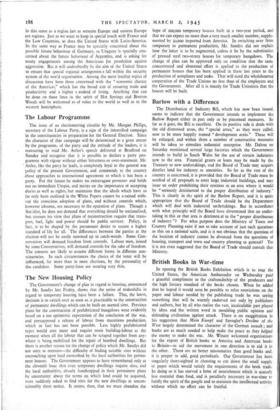The New Housing Policy
The Government's change of plan in regard to housing, announced by Mr. Sandys last Friday, shows that the series of makeshifts in regard to temporary housing have been a failure. This, the latest, decision is to switch over as soon as is practicable to the construction of permanent dwellings which can be built on normal sites. Previous plans for the construction of prefabricated bungalows were evidently based on a too optimistic expectation of the conclusion of the war, and presupposed a release of labour from munitions production, which in fact has not been possible. Less highly prefabricated types would cost more and require more building-labour at the moment when all the labour that can be scraped together from any- where is being mobilised for the repair of bombed dwellings. But
• there is another reason for the change of policy which Mr. Sandys did not omit to mention—the difficulty of finding suitable sites without encroaching upon land earmarked by the local authorities for perma- nent houses. The Government appears to have remembered only at the eleventh hour that even temporary dwellings require sites, and the local authorities, already handicapped in their permanent plans by uncertainty about the terms on which land could be acquired, were suddenly asked to find sites for the new dwellings at uncon- scionably short notice. It seems, then, that we must abandon the
hope of 200,000 temporary houses built in a two-year period, and that we can expect no more than a very much smaller number, supple- mented by 30,000 imported from America. In switching over from temporary to permanent production, Mr. Sandys did not explain how the latter is to be augmented, unless it be by the substitution of pressed steel two-storey houses for temporary bungalows. The change of plan can be approved only on condition that the same concentrated and abnormal effort is applied to the production of permanent houses that has been applied in these last years to the production of aeroplanes and tanks. That will need the wholehearted cooperation of the Trade Unions no less than of the employers and the Government. After all it is mainly for Trade Unionists that the houses will be built.


























 Previous page
Previous page